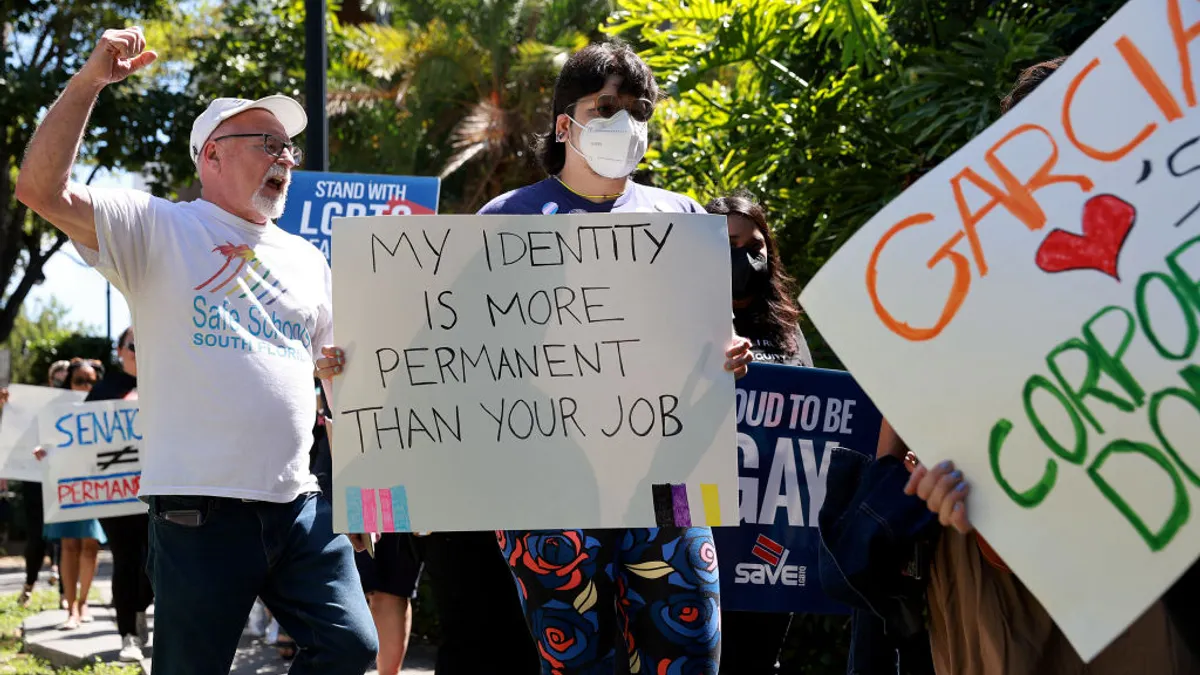When a pregnant employee comes to HR asking for accommodation, a flurry of questions probably pass through your head at once. What do I need to offer? How do I do it? And will the arrangement be fair — for the pregnant employee, for the team and for the company?
As with most compliance challenges, HR must strike a careful balance between what applicable laws require and ensuring that the business is not unduly burdened. So what’s the current guidance on this? We’ll take it law by law.
The Pregnancy Discrimination Act
The Pregnancy Discrimination Act of 1978 (PDA) amends Title VII, “prohibit[ing] sex discrimination on the basis of pregnancy.” As with the rest of Title VII, an employer cannot take adverse employment actions against an employee because of factors related to pregnancy. Easy enough. But does it require you to provide accommodations?
In Young v. United Parcel Service, a pregnant employee requested light duty after being advised by her doctors to lift no more than 20 pounds. UPS’s policy required an employee in her position to be able to lift 70 pounds. It denied the requested accommodation, instead having the employee take an extended unpaid leave which resulted in her losing her medical benefits.
The case made its way to the U.S. Supreme Court, which issued a somewhat complicated opinion. It vacated and remanded the lower court's ruling for the employer, however, noting that the plaintiff had successfully shown that UPS provided light-duty assignments to other employees. Why was that relevant? Because the PDA requires that employers treat pregnant women (or others covered by the law) "the same for all employment-related purposes, including receipt of benefits under fringe benefit programs, as other persons not so affected but similar in their ability or inability to work."
The lesson here: An employer would have to articulate a non-discriminatory reason for not accommodating a pregnant employee as it would other employees, Randy Gepp, an employment litigation attorney with Taylor English, told HR Dive. “So while [the PDA] doesn’t require accommodations itself, if an employer provides light duty or similar to employees on workers’ comp or with cancer, for example, the employer would have to provide similar accommodations to a pregnant employee,” Gepp said.
But the Court was careful not to grant pregnancy a more “favored” status than other employee statuses. As is the case with all protected classes, pregnancy doesn't protect an employee from adverse employment actions based on nondiscriminatory factors. Discipline and layoffs can proceed as usual, as long as the action isn't based on a pregnancy, the ability to become pregnant, or some other related factor, Anandhi Rajan, partner at Swift Currie, told HR Dive; "You just have to treat her the same as any non-pregnant employee,” she said.
The Family and Medical Leave Act
The phrase Family and Medical Leave Act (FMLA) may invoke feelings of dread in HR departments everywhere, but it's often an important part of compliance when a child is on the way — whether or not your employee is a birth mother.
The typical qualifications apply: an employer must have 50 employees or more, and the employee must have worked at the company for at least one year. If those (and a few other) requirements are met, employees generally have the right to take 12 weeks' unpaid leave for the birth or adoption of a child.
The FMLA doesn't entitle birth mothers to leave before the child is born due to pregnancy alone (though some states might — more on that later). They may be eligible for leave, however, if they have a "serious health condition," according to Matthew Curtin, shareholder at Littler Mendelson. “It’s something an employer may need to assess on a case-by-case basis," he said.
We recommend that you almost never challenge the condition over if it is serious. Even the flu can be a serious health condition that triggers FMLA.

Randy Gepp
Employment litigation attorney, Taylor English
So what is a “serious health condition”? It can vary, Gepp said, and “it doesn’t have to be too serious.” He defines it as “more than a cold” — nausea, cramps and other forms of illness could potentially all count. “We recommend that you almost never challenge the condition over if it is serious,” Gepp added. “Even the flu can be a serious health condition that triggers FMLA.”
But like the PDA, the FMLA doesn't grant pregnant employees immunity from unrelated employment actions. If an office is shuttered while someone is on leave, for example, or an entire job category is eliminated, an employer would likely be in the clear as long as the move wasn't related to the leave, Curtin said.
The Americans with Disabilities Act
But before you get too comfortable, the Americans with Disabilities Act (ADA) must be considered, too. Pregnancy alone does not bring ADA protections but medical conditions caused by pregnancy — gestational diabetes or preeclampsia, for example — could be a disability under the ADA, Gepp said.
That means employees may be entitled to accommodations during pregnancy; this can include leave, even if the FMLA's requirements haven't been met. And if something happens during or after birth, that also could trigger ADA protections — including further leave beyond FMLA, if needed, Rajan said. (For a full discussion on leave beyond what the FMLA requires, see Dealing with FMLA, ADA leave in a post-Severson landscape.)
And as with serious health conditions under the FMLA, be wary of spending too much time questioning whether an impairment is a covered "disability." Employers often lose when they do that, Gepp said. “In my advice to employers, if an employee has a doctor that is willing to certify she has a condition that is limiting beyond just being pregnant, it probably qualifies for ADA treatment,” he said; “You generally don’t want to be in a position as challenging a condition as a disability.”
State laws
Beyond the federal laws, at least 22 states have passed individual laws protecting pregnant workers:
Pregnancy accommodations across the country
- Accommodations required for pregnant employees

(Data from the National Women’s Law Center. Map excludes local ordinances.)
“If you are a multi-state employer, you need to look at the different requirements and forms," Curtin said, and you need to assess how you're going to approach pregnancy leave or accommodation when it comes up.
Best practices
Gepp said he generally takes “an expansive view” for his clients as, in his view, employers don’t want to be litigating these issues if they can avoid it. “I think most employers want to do the right thing and don’t know how to look at some of these problems,” he said. But there are some best practices employers may want consider:
Train your managers
When a worker needs help because of a disability, the ADA requires employers to engage in an interactive process with the employee regarding accommodation, and front-line managers may be on the receiving end of those initial requests. “Make sure your managers listen,” Curtin said. “It is a legal question and it is not always intuitive.”
Ensure all managers have training on handling requests for leave and other accommodations, including those that involve pregnancy. Employers can be liable for failing to provide an accommodation or leave if they knew or should have known that an employee needed something, so you may want to train managers to listen for things that might not be an "offical" request — and have them escalate those situations to HR.
Create solid job descriptions
The job description is one of the hardest working but most overlooked tools in HR. It can define the duties of a job and outline what tasks are considered essential — an important tool for the accommodation process.
“Without one, it's harder to prove down the road what the essential job duties are,” Curtin said.
Set reasonable expectations
Lots of laws require leave and lots of employers have their own offerings. But when it comes to the ADA, "no-fault" attendance policies, no matter how generous, can be risky. Instead, the law requires employers to address each situation on a case-by-case basis, although indefinite leave is never reasonable.
At the end of the day, minimum compliance is a must — but employers are often free to go beyond that. “What does an employer have to do to comply with the law and what does an employer want to do to further its culture? The two don’t always go hand-in-hand,” Curtin said.
For example, it's debatable whether severe morning sickness is a disability covered by ADA, but many employers opt to allow leave because they feel it's the right thing to do. And that is well within an employer’s right.




















